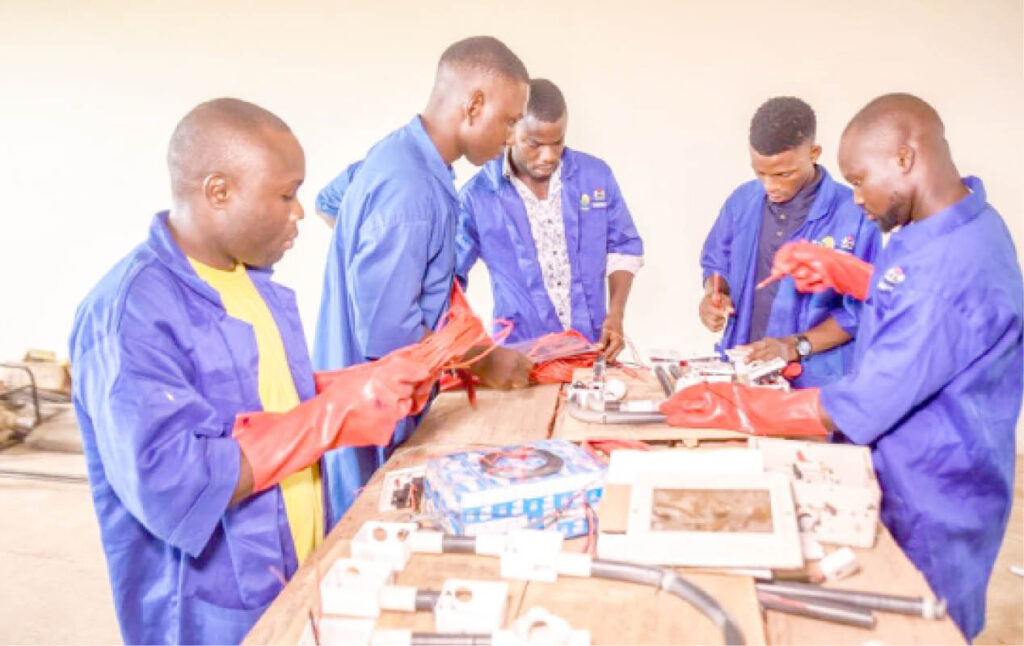Igbo Apprenticeship System Largest Business Incubator Globally: Urgent Call to Safeguard and Preserve Prosperity
Introduction
In the heartlands of southeastern Nigeria, a time-honored tradition known as the Igbo Apprenticeship System has stood as a testament to the resilience and entrepreneurial spirit of the Igbo people.
For generations, this unique system has been the bedrock of economic growth, cultivating successful entrepreneurs and fostering a vibrant business landscape.
However, in recent times, a disconcerting trend has emerged.
Many Igbos, once proud custodians of this invaluable tradition, now find themselves hesitating to embrace the system, influenced by disdainful remarks from certain Igbo elites.

Phrases like “He’s just a common trader” and derogatory labels such as “illiterates” have cast shadows on Igbo Apprenticeship system that has, in reality, produced more billionaires than any other institution in the world.
The prevalence of the “get rich quick” syndrome among the new generation of youths and the emergence of certain Ogas exhibiting greedy tendencies pose significant challenges to the enduring legacy of the Igbo Apprenticeship System (IAS), a concept that has stood the test of time.
The rising inclination toward instant gratification and rapid wealth accumulation among the youth contradicts the foundational principles of the IAS.
Traditionally, this system thrives on patience, diligence, and a gradual accumulation of skills through apprenticeship.
The allure of quick gains, often driven by external pressures and societal expectations,
threatens to erode the virtues that the Igbo Apprenticeship System (IAS) imparts, compromising the long-term success and sustainability it has historically offered.
Furthermore, the unfortunate emergence of some Ogas who succumb to greed represents a departure from the noble ideals of mentorship and community-building that the Igbo Apprenticeship System (IAS) embodies.
Ogas, who have themselves reaped the benefits of the system, must recognize their pivotal role in preserving its integrity.
Instances of Ogas exploiting their apprentices, either by withholding settlement or providing insufficient support, undermine the very foundation of trust and reciprocity upon which the IAS thrives.
In this exploration, we unravel the essence of the Igbo Apprenticeship System,
debunking misconceptions and championing the call to rekindle the appreciation for this powerful economic growth engine.
TYPES OF IGBO APPRENTICESHIP SYSTEM (IAS)
The Igbo apprentice system, often recognized as the Igbo trade apprentice system and colloquially referred to as ′Igba-Odibo/Igba-Boi/Imu-Ahia/Imu-Oru′,
represents a distinctive framework comprising both formal and informal indentured agreements among parties.
This system, deeply rooted in the cultural fabric of the Igbos, has played a pivotal role in fostering thriving entrepreneurial communities within the region.
Originating in South-Eastern Nigeria, the Igbo apprenticeship system has stood the test of time and continues to be a significant driver of economic development.
At its core, the Igbo apprentice system is designed to catalyze economic growth, enhance stability,
and promote sustainable livelihoods by channeling financial resources into the development of human capital through vocational training.
This unique economic model fosters a symbiotic relationship between mentors, often established business owners,

and apprentices seeking to acquire practical skills and knowledge in a specific trade.
One of the key elements of this system is the formalization of agreements, whether written or verbal, which outline the terms and conditions of the apprenticeship.
These agreements typically detail the duration of the apprenticeship, the responsibilities of both parties, and the compensation or benefits that the apprentice can expect to receive.
Such formalization ensures transparency and accountability, laying the groundwork for a successful partnership that benefits both mentor and apprentice.
The Igbo apprentice system extends beyond the mere transfer of technical skills; it encompasses a broader spectrum of knowledge,
including business acumen, cultural values, and ethical practices.
Apprentices not only gain proficiency in their chosen craft but also absorb valuable insights into entrepreneurship,
community engagement, and the principles of sustainable business practices.
Furthermore, this system serves as an avenue for social and economic mobility, offering individuals an opportunity to escape poverty and contribute meaningfully to their communities.
The mentorship aspect of the system not only imparts practical skills but also instills a sense of responsibility, work ethic,
and community engagement in apprentices, fostering a holistic approach to personal and professional development.
THE EVOLUTION OF IAS
In contemporary times, the Igbo apprentice system has evolved to adapt to changing economic landscapes and technological advancements.
While the essence of mentorship and vocational training remains intact, there is a recognition of the need to incorporate modern business practices and digital skills into the curriculum,
ensuring that apprentices are equipped to navigate the complexities of the globalized economy.

The Igbo apprentice system stands as a profound manifestation of the indomitable entrepreneurial spirit ingrained within the Igbo culture.
Rooted in a strategic induction approach, this system systematically introduces and immerses predominantly young Igbo individuals into various entrepreneurial ventures under the guidance of established entrepreneurs locally referred to as “Oga.”
These ventures encompass a diverse array of fields, including trades, enterprises, vocations, and, in some instances, even domestic services.
The Ogas, representing the seasoned entrepreneurs who have successfully navigated the apprentice system themselves, play a pivotal role in this informal framework.
Having once been apprentices, they are individuals who, upon completing their apprenticeships, were entrusted with resources to initiate and manage their own enterprises.
The Ogas, therefore, embody the cycle of mentorship and wealth creation integral to the Igbo apprentice system.
In its essence, this system is notably informal, characterized by unstructured training programs that focus on experiential learning.
Apprentices immerse themselves in the practical aspects of their chosen trades or vocations,
learning the intricacies and mastering the skills required to eventually embark on their entrepreneurial journeys.
This hands-on approach ensures a comprehensive understanding of the trade,
fostering not only technical proficiency but also a deep-rooted appreciation for the nuances of entrepreneurship.
Crucially, the Igbo apprentice system extends beyond the mere acquisition of skills; it serves as a transformative experience for young apprentices.
The mentor-mentee relationship forged between the Ogas and apprentices goes beyond the confines of a traditional teacher-student dynamic.
Ogas, drawing from their own experiences, impart not only technical know-how but also crucial life lessons,
ethical considerations, and the values essential for navigating the complexities of the business world.
The multifaceted nature of this system becomes evident as apprentices transition from being learners to active contributors within their respective fields.
The trust placed in apprentices as they evolve through the ranks is reflected in the resources handed over to them upon completion of their apprenticeships.
This gesture not only empowers the emerging entrepreneurs to establish their enterprises but also instills a sense of responsibility and commitment to the broader community.
While the Igbo apprentice system has thrived on its informal nature, there is an evolving recognition of the need for some level of structure to adapt to modern economic demands.
Efforts are being made to incorporate a more formalized framework that integrates contemporary business practices,
digital skills, and management principles into the traditional apprenticeship curriculum.
This adaptation aims to equip apprentices with the tools needed to navigate the challenges posed by the dynamic and globalized business landscape.
The Igbo apprentice system exhibits a nuanced structure with three major types, each tailored to specific aspects of entrepreneurial development:
Igba-boi, also known as Igba Odibo (become an apprentice),
Imu Oru, also known as Imu Oruaka (learn a craft), and Imu Ahia (learn a trade).
While all three types share the common goal of imparting entrepreneurial skills, they vary significantly in their approach and financial dynamics.
In the Igba-boi or Igba Odibo type, the emphasis lies in the mentor-mentee relationship, where a budding entrepreneur,
referred to as a mentee, willingly commits to an apprenticeship under the guidance of an established entrepreneur, the Oga.
In this arrangement, the mentee receives tutelage and hands-on experience free of charge for a pre-agreed period, allowing for the seamless transfer of skills and knowledge.
This type embodies the essence of mentorship, emphasizing the communal spirit of the Igbo people and fostering a sense of obligation to contribute to the broader entrepreneurial community.
On the other hand, the Imu Oru or Imu Oruaka, as well as Imu Ahia types, introduces a distinctive financial dynamic to the apprentice system.
In these categories, the mentee, or the mentee’s parents/sponsors, are required to remunerate the Oga for the mentorship and training provided.
This financial investment serves as a commitment to the learning process and signifies a recognition of the value of the skills being acquired.

The Imu Oru type focuses on the acquisition of craft skills, while the Imu Ahia type centers on the mastery of trade-related skills,
both contributing to the economic empowerment of the apprentices.
The financial aspect of the Imu Oru and Imu Ahia types adds a layer of economic pragmatism to the traditional mentorship model.
It establishes a financial exchange that not only sustains the mentor’s business but also instills in the mentee a sense of responsibility
and accountability for the resources invested in their education.
This dynamic reinforces the idea that entrepreneurship is not only about skills acquisition
but also about understanding the economic realities and responsibilities associated with running a successful business.
In recent times, there has been a growing acknowledgment of the need to strike a balance between the traditional apprenticeship model and contemporary economic demands.
Efforts are underway to incorporate structured training programs and modern business practices into all types of the Igbo apprentice system.
This adaptation seeks to equip apprentices with a well-rounded skill set, blending traditional craftsmanship with digital literacy and business acumen,
ensuring their preparedness for the evolving landscape of entrepreneurship.
In essence, the diverse types within the Igbo apprentice system reflect the richness of the Igbo entrepreneurial tradition.
Whether rooted in the communal spirit of Igba-boi or the financial commitments of Imu Oru and Imu Ahia,
this system remains a cornerstone of economic development in South-Eastern Nigeria, fostering a legacy of skilled entrepreneurs and vibrant communities.
ENSURING THE CONTINUITY OF IAS
The Igbo apprenticeship system stands as a cultural and economic treasure, and it should be actively encouraged and safeguarded to prevent it from fading into oblivion.
Harvard Business Review has aptly recognized the Igbo Apprenticeship System as the largest business incubator globally,
and this acknowledgment underscores its unparalleled contribution to entrepreneurship and economic development.
Encouraging the preservation and continuation of the Igbo apprenticeship system is imperative due to its remarkable role as a catalyst for business incubation.
Thousands of ventures emerge annually, nurtured by this unique system, which serves as a fertile ground for the cultivation of entrepreneurial skills and the establishment of new enterprises.

The Harvard Business Review’s endorsement underscores the system’s effectiveness in fostering a culture of innovation and economic growth, making it a model that should be preserved and celebrated.
The Harvard Business Review’s recognition underscores the scalability and impact of the Igbo Apprenticeship System.
By actively promoting and sustaining this system, we ensure the continuity of a proven model for developing successful entrepreneurs.
The incubator effect, as noted by Harvard, not only contributes to the economic vibrancy of the Igbo community
but also has the potential to serve as a global benchmark for fostering entrepreneurship and economic self-sufficiency.
Moreover, the Igbo apprenticeship system has cultural and societal implications that go beyond mere economic metrics.
It fosters a sense of community, mentorship, and shared responsibility.
By encouraging apprenticeship, we promote the transfer of traditional values, ethical business practices, and a strong work ethic from one generation to the next.
These values contribute to the fabric of society, instilling a sense of pride and communal spirit that extends beyond the realm of business.
Preserving the Igbo apprenticeship system aligns with the principles of sustainable development.
The system not only empowers individuals to create their ventures but also contributes to job creation, poverty alleviation, and community development.
This holistic approach to economic empowerment ensures that the benefits are widespread, reaching beyond individual entrepreneurs to positively impact the entire community.
The endorsement of the Igbo Apprenticeship System by Harvard Business Review underscores its global significance and effectiveness as a business incubator.
To allow this cultural and economic gem to fade into oblivion would be a loss not only for the Igbo community but for the broader global discourse on entrepreneurship and sustainable economic development.
By actively encouraging and preserving the Igbo apprenticeship system, we uphold a tradition that has proven itself as a beacon of entrepreneurship, innovation, and community resilience.
IAS A CORNERSTONE PRODUCING VISIONARY LEADERS
The Igbo Apprenticeship System (IAS) has been a powerful catalyst for economic prosperity in the Igbo nation, and its encouragement is vital for sustaining this legacy.
Examining notable success stories within the Igbo business community highlights the tangible positive effects of the apprenticeship system on the economic boom of the region.

- Innoson Motors – Innocent Chukwuma:
- Innocent Chukwuma, the founder of Innoson Motors, exemplifies the transformative impact of the Igbo apprenticeship system. Innoson Motors has grown to become the largest indigenous automobile manufacturing company by sales in Africa. Chukwuma’s journey from apprentice to industry leader underscores how the IAS nurtures individuals, equipping them with the skills and knowledge needed to establish and manage successful enterprises.
- Capital Oil & Gas – Ifeanyi Ubah:
- Ifeanyi Ubah, owner of Capital Oil & Gas, is another testament to the effectiveness of the Igbo apprenticeship system. His company, with one of the largest private fuel depots in Africa and extensive oil-related infrastructure, is a direct result of the entrepreneurial acumen instilled through the apprenticeship model. The IAS not only imparts technical skills but also cultivates a deep understanding of market dynamics and business secrets, crucial for success in the competitive energy sector.
- Coscharis Group – Cosmas Maduka:
- Cosmas Maduka, the visionary behind the diversified conglomerate Coscharis Group, showcases the inclusivity of the Igbo apprenticeship system. Despite not completing primary school, Maduka’s journey through the apprenticeship model allowed him to amass knowledge in manufacturing, automobiles, and petrochemicals. His success challenges conventional educational norms, emphasizing the apprenticeship model’s unique ability to serve as an alternative avenue for learning essential business skills.

These success stories highlight the diversity of achievements stemming from the Igbo apprenticeship system and underscore its role as a driving force behind the economic boom of the Igbo nation.
Beyond the impartation of technical skills, the apprenticeship system fosters a culture of entrepreneurship, resilience, and adaptability, enabling individuals to navigate complex market landscapes.
The positive effects extend beyond individual success to broader economic contributions.
The businesses founded by individuals who underwent apprenticeship not only generate employment opportunities but also contribute significantly to the economic vibrancy of the Igbo region.
Additionally, the apprenticeship system promotes a unique form of knowledge transfer, preserving traditional business practices and fostering a sense of community and shared values.
The success stories of entrepreneurs like Innocent Chukwuma, Senator Ifeanyi Ubah, and Cosmas Maduka serve as compelling examples of the transformative power of the Igbo Apprenticeship System.

Encouraging and preserving this system is not just about sustaining a tradition; it is an investment in the continued economic growth, innovation, and resilience of the Igbo nation.
The IAS remains a cornerstone for producing visionary leaders who contribute significantly to the prosperity and development of the region.
MASS SCALING OPPORTUNITIES FOR EVERYONE VIA IAS
The primary objective of the Igbo Apprenticeship System (IAS) is to proactively combat poverty by creating widespread opportunities for individuals within the community.
At the heart of this system lies a deeply ingrained belief among the Igbo people that each child born into the community is a communal responsibility.
This communal ethos is reflected in the tradition of naming children “Nwaoha,” which translates to “a child of the community.”
This naming practice symbolizes the collective commitment to ensuring the success and well-being of every child,
reinforcing the notion that the community plays a vital role in shaping the destiny of its members.
In the Igbo worldview, the community’s involvement in the upbringing and success of a child is a fundamental aspect of their societal fabric.
This collective responsibility extends to instances where parents may face challenges in raising their children.
In such cases, the community steps in to provide support, embodying the proverbial saying, “it takes a village to raise a child.”
The apprenticeship system serves as a tangible manifestation of this communal commitment to individual success.
In the apprenticeship process, a child, through a well-structured system, becomes integrated into a new family within the community.
This phase not only ensures the child’s well-being but also facilitates a seamless transition into the apprenticeship journey.
Over time, the apprentice progresses to working in the master’s business, gaining practical skills and insights into the chosen trade.
One distinctive feature of the Igbo apprenticeship system is the concept of being “settled.”
After a dedicated period of apprenticeship, the mentor willingly relinquishes market share by providing essential support to the mentee.
This support may include directing customers to the new venture, offering financial assistance, and sharing critical business insights.
Remarkably, this is done without any expectation of equity or ownership in the apprentice’s emerging business.
This unique aspect of the apprenticeship system exemplifies a profound sense of mentorship, communal solidarity, and a forward-looking approach to economic empowerment.
By willingly supporting the mentee’s transition to entrepreneurship, the master contributes not only to the success of an individual but also to the overall prosperity of the community.
The Igbo Apprenticeship System, therefore, emerges not only as a vehicle for individual economic upliftment but also as a testament to the power of community-driven initiatives in breaking the cycle of poverty.
Encouraging and preserving this system becomes not just a cultural imperative but a pragmatic strategy for fostering sustainable development and shared prosperity within the Igbo society.
CONCLUSION
In the face of modern challenges and the allure of get-rich-quick schemes, the time-tested Igbo Apprenticeship System (IAS) stands as a beacon of enduring success.
To the ambitious and vibrant youths of Igbo extraction, we extend a call to embrace this economic growth engine, recognizing its potential to shape destinies and transform lives.
It’s an invitation to trade the allure of quick gains for the enduring wealth that comes from patiently learning a craft, vocation, or trade.
The illustrious stories of Innoson, Coscharis, and numerous other billionaires who proudly bear the mark of IAS graduates should serve as a clarion call.
Let their journeys inspire a generation to eschew shortcuts and humbly submit to the enriching process of apprenticeship.
In the halls of this traditional system lies the pathway to not just financial success, but to a profound understanding of market dynamics, business secrets, and a holistic approach to entrepreneurship.
To safeguard the IAS from these detrimental influences, a multifaceted approach is essential.

Firstly, a concerted effort to reshape societal attitudes toward success, emphasizing the value of skill development, patience, and long-term planning, is crucial.
By fostering a cultural shift that places emphasis on the journey of acquiring expertise rather than instant financial gains, we can reinstate the core principles of the apprenticeship system.
To the graduates who have become Ogas, guardians of the IAS flame, a solemn reminder is extended.
As custodians of a noble tradition, resist the temptation to shortchange your apprentices.

The practice of settling apprentices after the agreed period of Igba-boi is not just a mere transaction; it is a sacred covenant that ensures the perpetuity of success.
Additionally, there must be a collective commitment among Ogas to uphold the spirit of mentorship and fair dealing.
Ogas should view themselves as stewards of a cherished tradition, recognizing the responsibility to pass on not just skills but also the values of integrity,
generosity, and community support that underpin the IAS.
By providing market share, customers, and essential support, you pave the way for the next generation of entrepreneurs to thrive.
The Igbo apprentice system stands as a testament to the resilience and adaptability of traditional economic models.
By nurturing a symbiotic relationship between mentors and apprentices, this system continues to be a driving force behind the entrepreneurial spirit of the Igbos,
fostering economic growth, stability, and sustainable livelihoods within the South-Eastern region of Nigeria.
As we navigate the complexities of the modern business world, let us remember that the Igbo Apprenticeship System is not just a relic of the past;

it is a living, breathing concept that demands our collective commitment. All hands must be on deck to preserve and promote this noble tradition,
ensuring that the invaluable lessons of mentorship, resilience, and community-driven success continue to shape the destiny of the Igbo people.
While the challenges of the “get rich quick” syndrome and Oga greed may cast shadows on the IAS, they are not insurmountable.
Through conscious efforts to reorient societal values and encourage responsible mentorship, the Igbo Apprenticeship System can continue to thrive as a beacon of economic empowerment and community development.
It is imperative for all stakeholders, from the aspiring youths to the seasoned Ogas, to actively contribute to the preservation and enhancement of this time-tested concept for the benefit of present and future generations.
In embracing the enduring legacy of the IAS, we forge a path towards sustainable economic growth, where every apprentice has the opportunity to become the next proud standard-bearer of this time-honored tradition.
Rev. Innocent Chukwudi Peace-Udochukwu, The Executive Director Nigeria 2.0, Public Relations Officer PRO Igbo Ruo Ulo Worldwide writes from Abuja





Leave a Reply